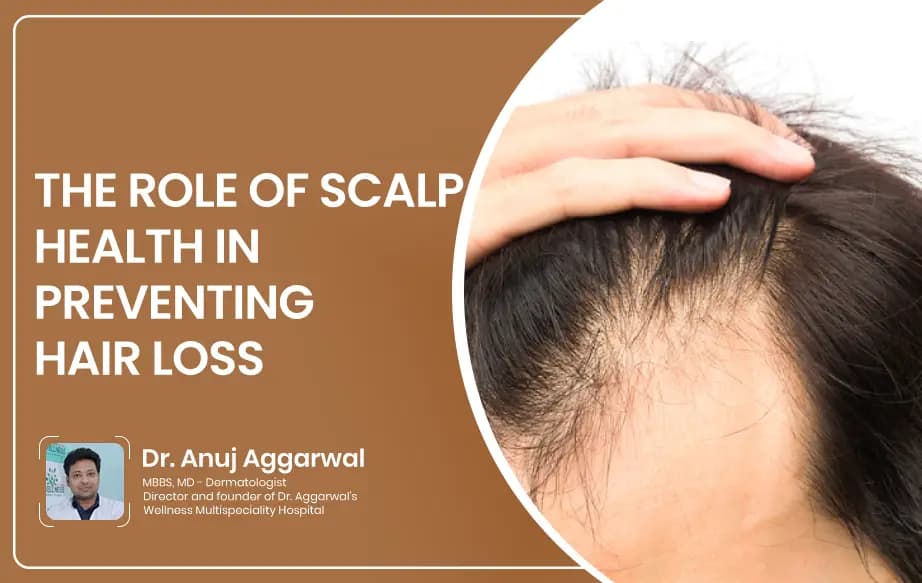
The Role of Scalp Health in Preventing Hair Loss
Hair loss is a common concern for both men and women, affecting confidence and self-esteem. While genetics, stress, diet, and hormonal imbalances are well-known causes of hair fall, one crucial but often overlooked factor is scalp health. The scalp is the foundation of hair growth, much like soil is to a plant. If the scalp is unhealthy, hair follicles can become weak, clogged, or inflamed, resulting in thinning hair or hair loss.
In this blog, we’ll explore the critical relationship between scalp health and hair loss, understand what affects scalp condition, signs to watch out for, and effective ways to keep your scalp in top shape.
Why Scalp Health Matters for Hair Growth
Your scalp is more than just skin under your hair; it contains about 100,000 hair follicles, each responsible for producing a strand of hair. These follicles need a clean, well-nourished, and well-oxygenated environment to thrive. Poor scalp health can lead to:
-
Follicle miniaturization (shrinking of hair follicles)
-
Reduced blood flow
-
Clogged pores with oil, dead skin, or product residue
-
Inflammation and infection
These issues weaken hair at the root, leading to excessive shedding, slow regrowth, or even permanent hair loss over time.
Common Scalp Issues That Lead to Hair Loss
1. Dandruff (Seborrheic Dermatitis)
Dandruff is one of the most common scalp conditions, often caused by yeast overgrowth, oily skin, or sensitivity to hair products. It causes itching and flaking, which may damage follicles if left untreated.
2. Scalp Psoriasis
An autoimmune condition that causes thick, red patches covered with silvery scales. This can disrupt hair follicle activity, leading to hair breakage or temporary hair loss.
3. Fungal Infections (Tinea Capitis)
Ringworm on the scalp can cause scaly, itchy patches, often accompanied by hair loss in that area. It’s more common in children but can affect adults too.
4. Excess Oil and Sebum Buildup
While natural oils are important, too much oil can clog pores, create a breeding ground for bacteria, and suffocate hair follicles.
5. Dry Scalp
Dry scalp can cause irritation, flaking, and itching. Scratching may harm follicles, and dryness can reduce scalp elasticity and blood circulation.
6. Poor Hygiene and Product Buildup
Using too many styling products or not washing your hair regularly can cause product buildup, blocking the hair follicles and weakening the roots.
Read more: FUE Hair Transplant: Benefits, Procedure & Recovery
Signs of an Unhealthy Scalp
-
Persistent dandruff or flaking
-
Itching or tenderness
-
Redness or inflammation
-
Hair that breaks easily or sheds excessively
-
Oily or greasy scalp even after washing
-
Bad scalp odor
-
Pimples or bumps on the scalp
If you experience these symptoms, it’s essential to address them promptly, as they may lead to long-term hair damage if ignored.
The Scalp-Hair Cycle Connection
Hair grows in cycles: Anagen (growth), Catagen (transition), and Telogen (resting/shedding). Poor scalp health can disrupt this cycle, pushing more hairs into the telogen phase, which results in noticeable hair fall.
A healthy scalp ensures:
-
Adequate nutrient delivery to hair follicles
-
Efficient cell turnover
-
Reduced inflammation and infection
-
Proper moisture and oil balance
This balance is key to maintaining consistent hair growth and thickness.
How to Improve and Maintain Scalp Health
1. Keep the Scalp Clean
Wash your hair regularly using a mild, sulfate-free shampoo. How often depends on your hair type oily scalps may need washing every 2-3 days, while dry scalps can be washed less frequently.
2. Exfoliate the Scalp
Just like your face, your scalp also benefits from gentle exfoliation. Use scalp scrubs or exfoliating shampoos once a week to remove dead skin and buildup.
3. Massage Regularly
Scalp massage improves blood circulation, delivering more oxygen and nutrients to hair follicles. Use fingertips or a scalp massager for 5–10 minutes daily. You can also use oils like coconut, almond, or castor oil during the massage.
4. Use Scalp-Soothing Products
If you have sensitivity, dandruff, or itching, opt for shampoos with:
-
Tea tree oil (antifungal and antibacterial)
-
Salicylic acid (exfoliating)
-
Ketoconazole (antifungal for dandruff)
-
Aloe vera or calendula (soothing and hydrating)
5. Avoid Harsh Chemicals
Limit the use of products with alcohol, sulfates, parabens, or synthetic fragrances that can irritate the scalp.
6. Eat a Balanced Diet
Nutritional deficiencies can directly affect your scalp and hair health. Include:
-
Biotin (eggs, nuts, seeds)
-
Zinc (whole grains, legumes)
-
Iron (leafy greens, red meat)
-
Vitamin D and E (sunlight, nuts, avocados)
-
Omega-3 fatty acids (flaxseeds, fish)
7. Manage Stress
Chronic stress can increase cortisol levels, which can trigger scalp inflammation and disrupt the hair growth cycle. Try yoga, meditation, or exercise to relieve stress.
8. Stay Hydrated
Drink enough water daily to keep your scalp moisturized from within. Dehydration can lead to a dry, tight scalp that hinders healthy growth.
Read more: FUT Hair Transplant: Benefits, Procedure & Recovery
Professional Scalp Treatments
If home remedies don’t improve your scalp condition, consult a dermatologist or trichologist. Some advanced treatments include:
• Scalp Microneedling
Stimulates collagen production and improves blood flow to the scalp.
• PRP Therapy (Platelet-Rich Plasma)
Involves injecting your blood plasma into the scalp to stimulate follicle growth.
• Laser Therapy
Low-level laser therapy (LLLT) improves cell activity in hair follicles.
• Medicated Shampoos & Topical Treatments
Doctors may recommend special products based on your scalp type and condition.
Final Thoughts
A healthy scalp is the root of healthy hair. No matter how many hair masks or oils you apply, if your scalp is not well cared for, hair growth will suffer. By maintaining scalp hygiene, eating a balanced diet, and avoiding harsh chemicals, you create the perfect environment for hair to grow thicker, longer, and stronger.
So the next time you notice hair fall, don’t just blame your hair products or genetics, start with your scalp.
Content Created By:

CyberBizz Technologies
Team, Content Curator
